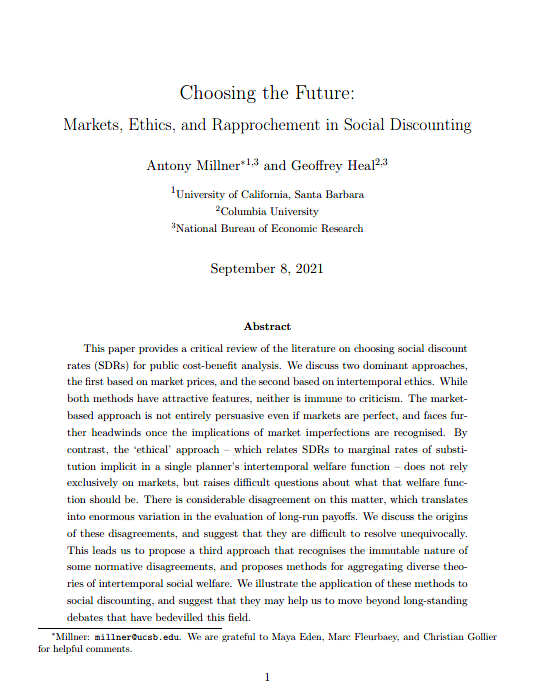Choosing the future: Markets, ethics and rapprochement in social discounting
Antony Millner (University of California, Santa Barbara and National Bureau of Economic Research) and Geoffrey Heal (Columbia University and National Bureau of Economic Research)
GPI Working Paper No. 13-2021, published in Journal of Economics Literature
This paper provides a critical review of the literature on choosing social discount rates (SDRs) for public cost-benefit analysis. We discuss two dominant approaches, the first based on market prices, and the second based on intertemporal ethics. While both methods have attractive features, neither is immune to criticism. The market-based approach is not entirely persuasive even if markets are perfect, and faces further headwinds once the implications of market imperfections are recognised. By contrast, the ‘ethical’ approach – which relates SDRs to marginal rates of substitution implicit in a single planner’s intertemporal welfare function – does not rely exclusively on markets, but raises difficult questions about what that welfare function should be. There is considerable disagreement on this matter, which translates into enormous variation in the evaluation of long-run payoffs. We discuss the origins of these disagreements, and suggest that they are difficult to resolve unequivocally. This leads us to propose a third approach that recognises the immutable nature of some normative disagreements, and proposes methods for aggregating diverse theories of intertemporal social welfare. We illustrate the application of these methods to social discounting, and suggest that they may help us to move beyond long-standing debates that have bedevilled this field.
Other working papers
Once More, Without Feeling – Andreas Mogensen (Global Priorities Institute, University of Oxford)
I argue for a pluralist theory of moral standing, on which both welfare subjectivity and autonomy can confer moral status. I argue that autonomy doesn’t entail welfare subjectivity, but can ground moral standing in its absence. Although I highlight the existence of plausible views on which autonomy entails phenomenal consciousness, I primarily emphasize the need for philosophical debates about the relationship between phenomenal consciousness and moral standing to engage with neglected questions about the nature…
Three mistakes in the moral mathematics of existential risk – David Thorstad (Global Priorities Institute, University of Oxford)
Longtermists have recently argued that it is overwhelmingly important to do what we can to mitigate existential risks to humanity. I consider three mistakes that are often made in calculating the value of existential risk mitigation: focusing on cumulative risk rather than period risk; ignoring background risk; and neglecting population dynamics. I show how correcting these mistakes pushes the value of existential risk mitigation substantially below leading estimates, potentially low enough to…
How to neglect the long term – Hayden Wilkinson (Global Priorities Institute, University of Oxford)
Consider longtermism: the view that, at least in some of the most important decisions facing agents today, which options are morally best is determined by which are best for the long-term future. Various critics have argued that longtermism is false—indeed, that it is obviously false, and that we can reject it on normative grounds without close consideration of certain descriptive facts. In effect, it is argued, longtermism would be false even if real-world agents had promising means…

